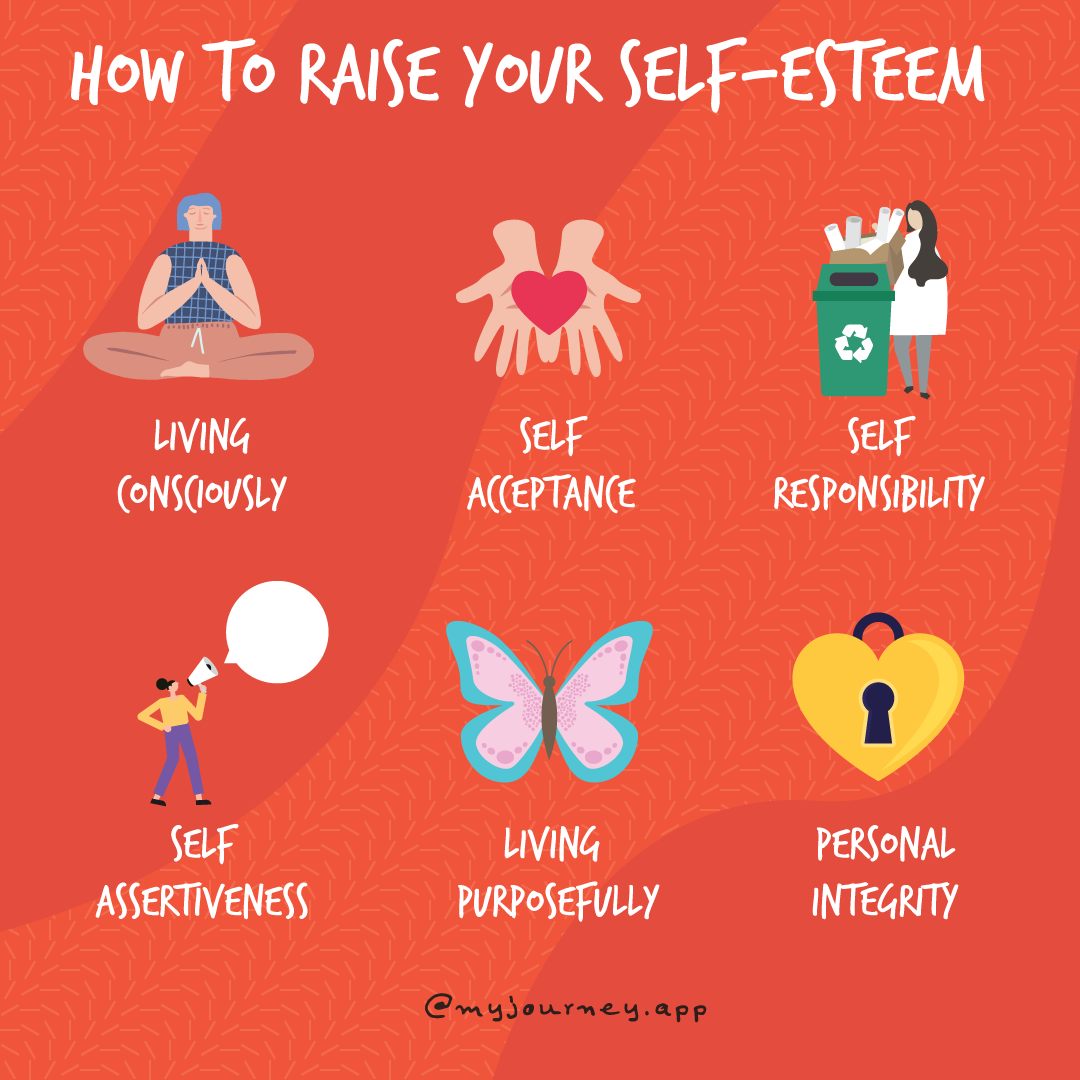The Six Pillars of Self-Esteem by Nathaniel Branden
Self-esteem is like a castle that sits atop six strong pillars and serves as a foundation for your life. Without high self-esteem, you'll have trouble in every aspect of your life.

Self-esteem is an important part of our overall mental health and well-being. It is the opinion that we form of ourselves and how we value ourselves as individuals. It is also the way we think, feel, and act in response to our own abilities, successes, and failures. It also has the capacity to affect our relationships, our work, and our overall outlook on life. Self-esteem is thus, an important factor in our overall happiness and success in life.
The two main components of self-esteem are having the confidence to face the challenges of life, and feeling like you're worthy of happiness. You deserve to be happy, and you have every right to voice your opinions, wants and needs. Your thoughts and ideas are important and everything about you is unique.

Your self-esteem is influenced by your actions and your actions are influenced by your self-esteem. You can think of it like a feedback loop that never turns off. To improve your own self-esteem, Dr. Nathanial Branden's six pillars can guide you to practice and live your life in confidence, faith, and the drive to move through life's challenges.
The Six Pillars of Self-Esteem by Nathaniel Branden
“The Six Pillars of Self-Esteem” is a self-help and psychology book in which author Dr. Nathaniel Branden describes the key elements that raise or lower the self-esteem of an individual. It includes exercises, mindsets, and beliefs to help readers increase their self-esteem.
What is Self-esteem?
Dr. Nathaniel Branden clearly defines self-respect and self-esteem in his book. He believed that two components, self-efficacy and self-respect, defined self-esteem:
Self-efficacy is the confidence a person has to cope with the challenges that life presents successfully. And self-respect is the belief that a person deserves happiness and love.

Self-esteem is then, how an individual perceives and evaluates themselves. It is related to the emotional and cognitive way a person understands and experiences themselves as they move through their life. It also means that a person takes responsibility for their actions and the role that they play in their social circles and within larger society.
Someone with healthy self-esteem can respond appropriately to the changes that come about in life. They would possess to cognitive ability to learn and make sound life decisions based on the facts presented in front of them or as a situation unfolds in front of them.
The 6 Pillars Of Self-Esteem
Branden states that self-esteem must be crafted carefully over time with the actions he details in his six pillars theory, and that it cannot be brought on by a passing compliment from a stranger. It takes time and work to build formidable self-esteem that we can carry through with us.
The 6 Pillars Branden outlines in his book include the following:
1. Living consciously
Consciousness is the state of being aware of the reality of things around you. Living consciously refers to the ability to see the power of your thoughts and how your behavior affects yourself and others.
To improve self-esteem, Brendan posits that it begins with shifting our mindset to living consciously. By living consciously and being present in the moment, we switch off the “autopilot” mode and begin questioning things and thinking about our needs, wants, emotions, and the realities of the outer world; facts and interpretations. When we live consciously, we get closer to reality. We also gain a fundamental understanding of ourselves, which is a base for our overall well-being.
2. Self-acceptance
In the practice of self-acceptance, if we can make peace with the people that we are in this moment, we can accept our behavior, see the way for improvement, and thus be willing to act to become better selves. Being conscious of the fact that that you are bound to experience lapses and setbacks along with your successes and leaps forward.
3. Self-responsibility
The practice of self-responsibility is about taking control life and happiness by being solution-oriented. If you accept and acknowledge that it is not someone else’s job to make us happy, you start to take full responsibility for our life choices and our own happiness. Instead of being hung about the problem at hand and asking "Why me?", whenever a problem arises, ask yourself “What can I do about it?” instead.

Self-responsibility is how we respond to life’s challenges. Ideally, we would want to work towards doing this in a healthy and autonomous manner. Often, when we are faced with situations that are out of our control or are not working in our favor, we can find ourselves blaming everyone and everything around us for the situation and results. But by acting towards completing our own goals and manifesting our desires by living by our own standards, it gets embedded in our core beliefs that we are solely responsible for ensuring that we are happy and satisfied by our own means.
4. Self-assertiveness
Self-assertiveness refers to the willingness to stand up for yourself, to be who you are openly and authentically, and treating yourself with respect in all human interactions. It is about knowing your needs and being able to express them clearly, directly, and calmly to others.
This simply means that self-esteem comes from being real and authentic; who you uniquely are. And to practice self-assertiveness, we need the conviction that our beliefs, values, ideas, needs and wants are important too. If you have the willingness to confront the challenges of life and to strive for mastery, your self-esteem gets naturally impacted as well.
5. Living purposefully
Living purposefully refers to having goals that you want to achieve in your life and acting accordingly to reach them. This required you to use your power and expend effort for the attainment of goals that you have chosen and that are meaningful to you in ways that would benefit you and also not harm others in the process.
To live purposefully is to live productively and the process of making ourselves competent to life. Productivity is the act of making meaning of our existence by translating our thoughts and dreams into reality and setting goals and working for their fruition.

If you're looking for a way to assure yourself of your competencies and to motivate yourself further, you can look into starting a success journal to list your accomplishments every now and then. These accomplishments need not be the biggest awards or accolades you've gotten. Because keeping track of even the small wins and personal successes can be the perfect motivation you need.
To start success journaling, explore the digital diary space that Journey offers. Journey has multiple tools and aids that will guide you through your journaling. If you're new to journaling and are unsure of how to start, you can even explore journaling coach programs or templates that are available can help you delve deeper into yourself and your thoughts.

A success diary or journal need not just be a ledger of your accomplishments. Together with keeping a list, you can reflect on each accomplishment and think about how it made you feel. Writing down even the tiniest of achievements every day has the potential to change our brains. Writing down what you did well can give you a sense of achievement. Positive emotions like this release dopamine in your brain. This makes you feel good, gives you energy and motivates you to keep doing things that will trigger the release of more dopamine.
6. Personal integrity
Personal integrity is about making sure that our actions match our goals, and at the same time, making our behavior match our words. The practice of personal integrity unites and completes the other five pillars. Without integrity, the preceding practices don't hold ground. We need to establish and live by our ideals, convictions, standards, and beliefs to behave the way we genuinely want and aspire to be.
This pillar is perhaps the hardest one to practice considering all the external pressure we could feel and experience. Integrity does not guarantee that we will make the best choice for us. It only asks of our effort to find the best choice, to be authentic in the process, that we stay conscious, and stay connected with our knowledge.
Having a healthy self-esteem can help us to feel more confident, motivated, and capable of achieving our goals. When you have good self-esteem, you will have the confidence to take on life's fiercest challenges and you would be able to trust your own thoughts ideas and direction. You can adapt to change and not take what others say to you personally.
If we understand the above 6 practices, we can commit to inculcating them within ourselves and building our self-esteem for our benefit and to live our lives to the fullest.



